高考语法考点突破5:非谓语动词(含解析)
图片预览
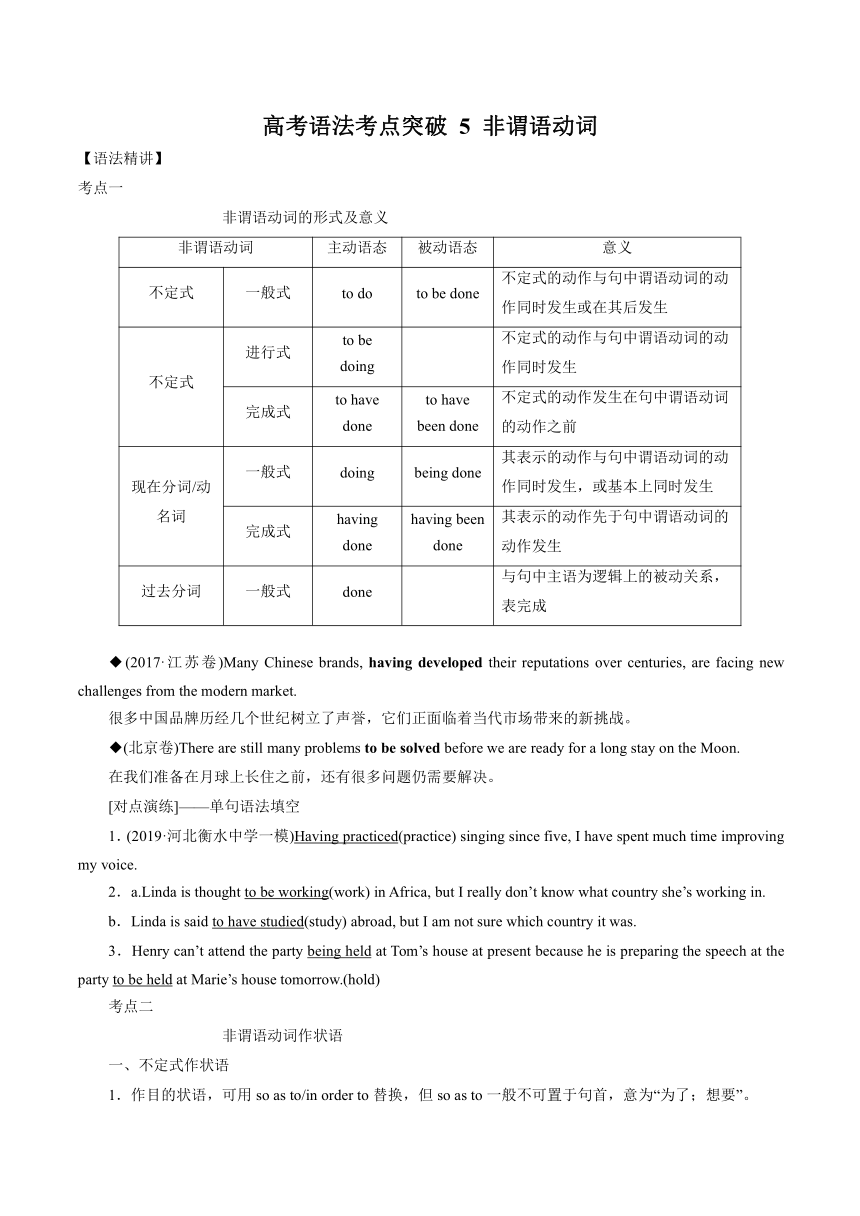
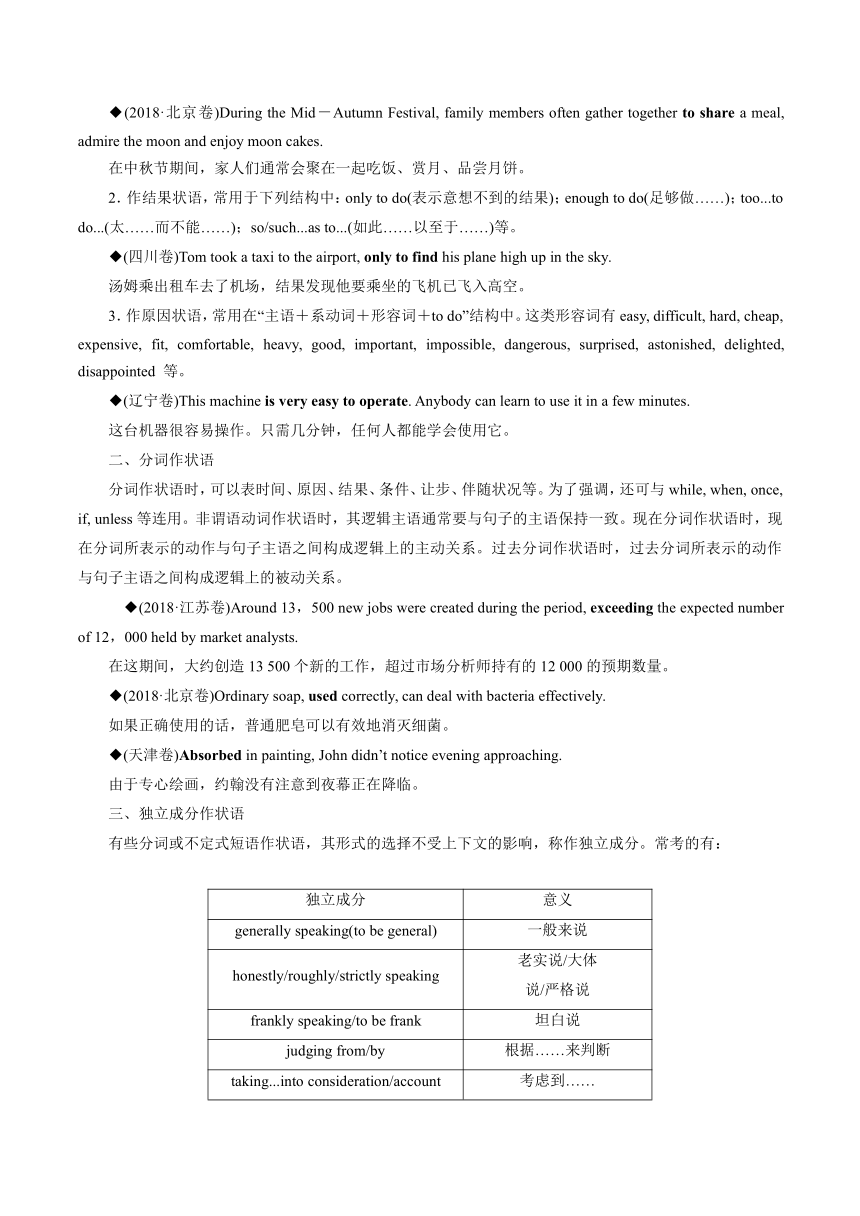
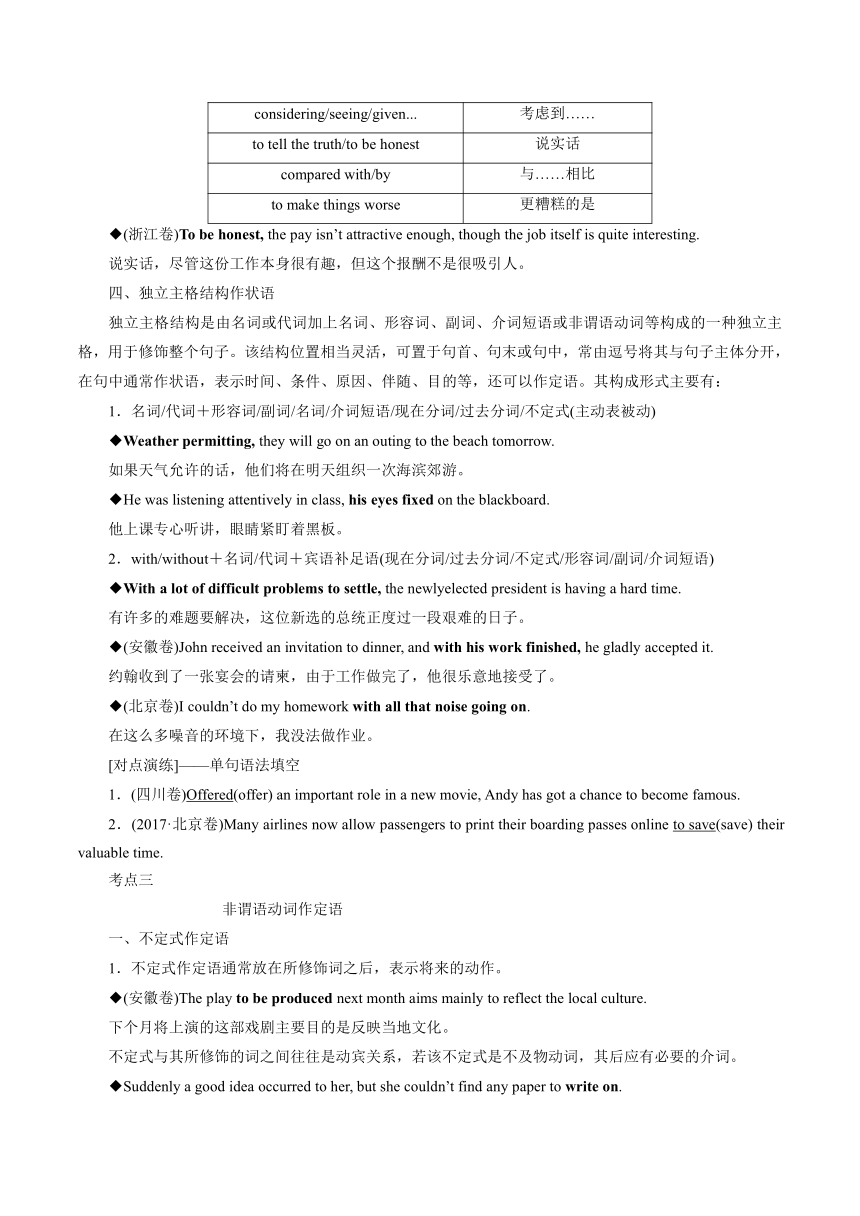
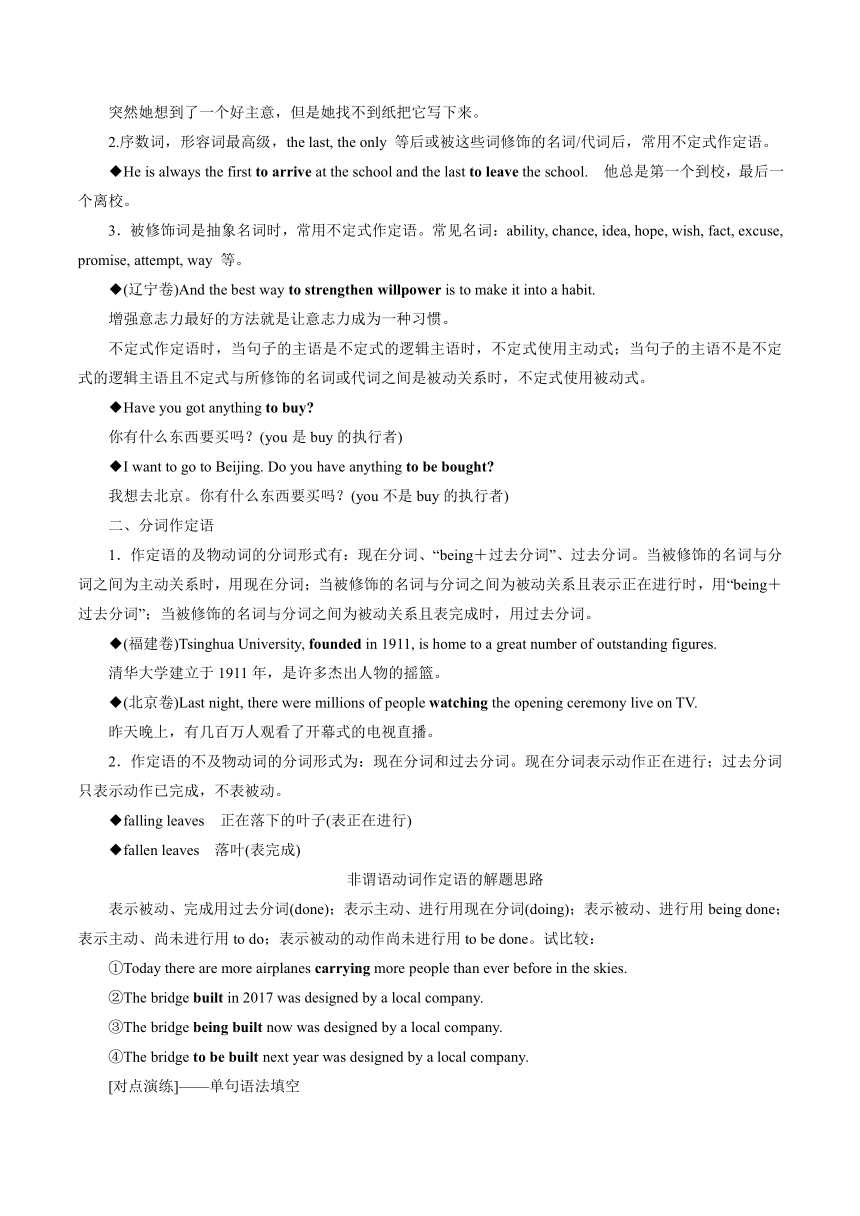
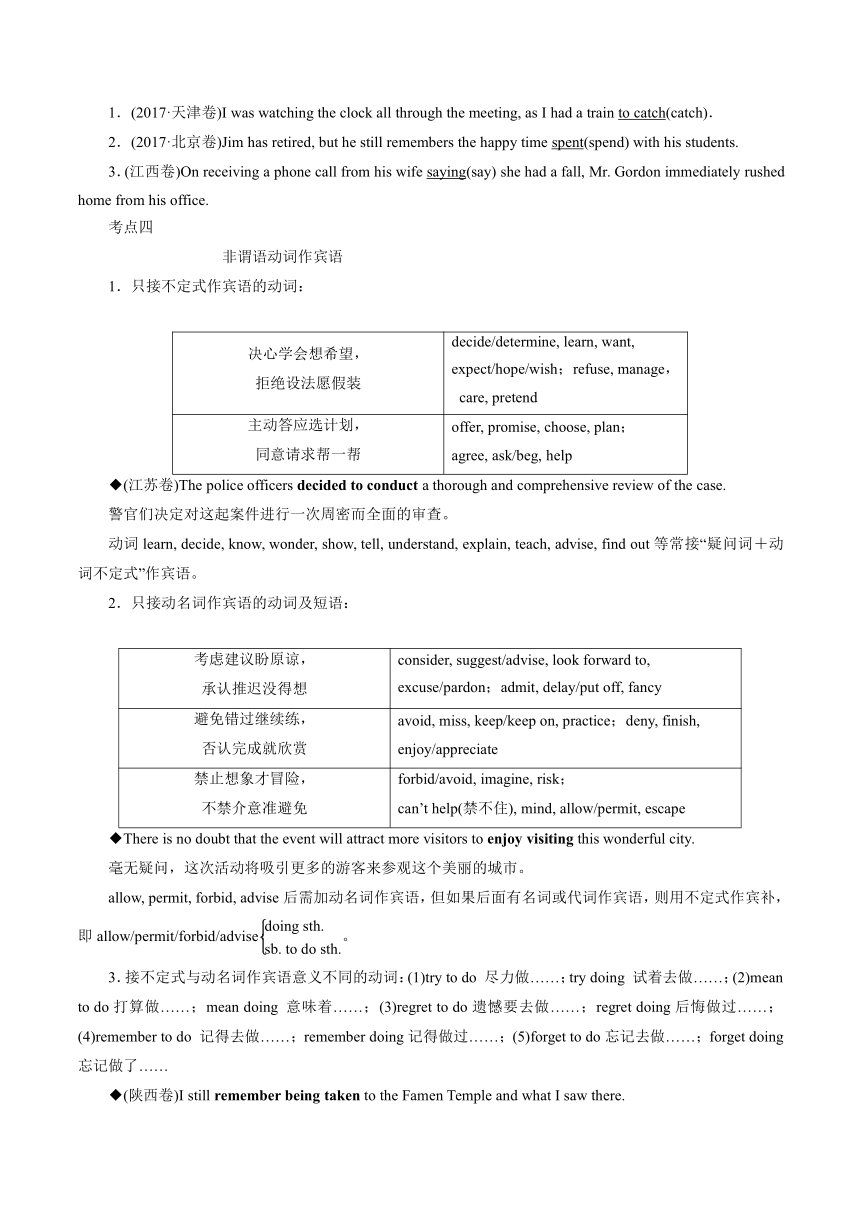
文档简介
高考语法考点突破
5
非谓语动词
【语法精讲】
考点一
非谓语动词的形式及意义
非谓语动词
主动语态
被动语态
意义
不定式
一般式
to
do
to
be
done
不定式的动作与句中谓语动词的动作同时发生或在其后发生
不定式
进行式
to
be
doing
不定式的动作与句中谓语动词的动作同时发生
完成式
to
have
done
to
have
been
done
不定式的动作发生在句中谓语动词的动作之前
现在分词/动名词
一般式
doing
being
done
其表示的动作与句中谓语动词的动作同时发生,或基本上同时发生
完成式
having
done
having
been
done
其表示的动作先于句中谓语动词的动作发生
过去分词
一般式
done
与句中主语为逻辑上的被动关系,表完成
◆(2017·江苏卷)Many
Chinese
brands,
having
developed
their
reputations
over
centuries,
are
facing
new
challenges
from
the
modern
market.
很多中国品牌历经几个世纪树立了声誉,它们正面临着当代市场带来的新挑战。
◆(北京卷)There
are
still
many
problems
to
be
solved
before
we
are
ready
for
a
long
stay
on
the
Moon.
在我们准备在月球上长住之前,还有很多问题仍需要解决。
[对点演练]——单句语法填空
1.(2019·河北衡水中学一模)Having
practiced(practice)
singing
since
five,
I
have
spent
much
time
improving
my
voice.
2.a.Linda
is
thought
to
be
working(work)
in
Africa,
but
I
really
don’t
know
what
country
she’s
working
in.
b.Linda
is
said
to
have
studied(study)
abroad,
but
I
am
not
sure
which
country
it
was.
3.Henry
can’t
attend
the
party
being
held
at
Tom’s
house
at
present
because
he
is
preparing
the
speech
at
the
party
to
be
held
at
Marie’s
house
tomorrow.(hold)
考点二
非谓语动词作状语
一、不定式作状语
1.作目的状语,可用so
as
to/in
order
to替换,但so
as
to一般不可置于句首,意为“为了;想要”。
◆(2018·北京卷)During
the
Mid-Autumn
Festival,
family
members
often
gather
together
to
share
a
meal,
admire
the
moon
and
enjoy
moon
cakes.
在中秋节期间,家人们通常会聚在一起吃饭、赏月、品尝月饼。
2.作结果状语,常用于下列结构中:only
to
do(表示意想不到的结果);enough
to
do(足够做……);too...to
do...(太……而不能……);so/such...as
to...(如此……以至于……)等。
◆(四川卷)Tom
took
a
taxi
to
the
airport,
only
to
find
his
plane
high
up
in
the
sky.
汤姆乘出租车去了机场,结果发现他要乘坐的飞机已飞入高空。
3.作原因状语,常用在“主语+系动词+形容词+to
do”结构中。这类形容词有easy,
difficult,
hard,
cheap,
expensive,
fit,
comfortable,
heavy,
good,
important,
impossible,
dangerous,
surprised,
astonished,
delighted,
disappointed
等。
◆(辽宁卷)This
machine
is
very
easy
to
operate.
Anybody
can
learn
to
use
it
in
a
few
minutes.
这台机器很容易操作。只需几分钟,任何人都能学会使用它。
二、分词作状语
分词作状语时,可以表时间、原因、结果、条件、让步、伴随状况等。为了强调,还可与while,
when,
once,
if,
unless等连用。非谓语动词作状语时,其逻辑主语通常要与句子的主语保持一致。现在分词作状语时,现在分词所表示的动作与句子主语之间构成逻辑上的主动关系。过去分词作状语时,过去分词所表示的动作与句子主语之间构成逻辑上的被动关系。
◆(2018·江苏卷)Around
13,500
new
jobs
were
created
during
the
period,
exceeding
the
expected
number
of
12,000
held
by
market
analysts.
在这期间,大约创造13
500个新的工作,超过市场分析师持有的12
000的预期数量。
◆(2018·北京卷)Ordinary
soap,
used
correctly,
can
deal
with
bacteria
effectively.
如果正确使用的话,普通肥皂可以有效地消灭细菌。
◆(天津卷)Absorbed
in
painting,
John
didn’t
notice
evening
approaching.
由于专心绘画,约翰没有注意到夜幕正在降临。
三、独立成分作状语
有些分词或不定式短语作状语,其形式的选择不受上下文的影响,称作独立成分。常考的有:
独立成分
意义
generally
speaking(to
be
general)
一般来说
honestly/roughly/strictly
speaking
老实说/大体
说/严格说
frankly
speaking/to
be
frank
坦白说
judging
from/by
根据……来判断
taking...into
consideration/account
考虑到……
considering/seeing/given...
考虑到……
to
tell
the
truth/to
be
honest
说实话
compared
with/by
与……相比
to
make
things
worse
更糟糕的是
◆(浙江卷)To
be
honest,
the
pay
isn’t
attractive
enough,
though
the
job
itself
is
quite
interesting.
说实话,尽管这份工作本身很有趣,但这个报酬不是很吸引人。
四、独立主格结构作状语
独立主格结构是由名词或代词加上名词、形容词、副词、介词短语或非谓语动词等构成的一种独立主格,用于修饰整个句子。该结构位置相当灵活,可置于句首、句末或句中,常由逗号将其与句子主体分开,在句中通常作状语,表示时间、条件、原因、伴随、目的等,还可以作定语。其构成形式主要有:
1.名词/代词+形容词/副词/名词/介词短语/现在分词/过去分词/不定式(主动表被动)
◆Weather
permitting,
they
will
go
on
an
outing
to
the
beach
tomorrow.
如果天气允许的话,他们将在明天组织一次海滨郊游。
◆He
was
listening
attentively
in
class,
his
eyes
fixed
on
the
blackboard.
他上课专心听讲,眼睛紧盯着黑板。
2.with/without+名词/代词+宾语补足语(现在分词/过去分词/不定式/形容词/副词/介词短语)
◆With
a
lot
of
difficult
problems
to
settle,
the
newlyelected
president
is
having
a
hard
time.
有许多的难题要解决,这位新选的总统正度过一段艰难的日子。
◆(安徽卷)John
received
an
invitation
to
dinner,
and
with
his
work
finished,
he
gladly
accepted
it.
约翰收到了一张宴会的请柬,由于工作做完了,他很乐意地接受了。
◆(北京卷)I
couldn’t
do
my
homework
with
all
that
noise
going
on.
在这么多噪音的环境下,我没法做作业。
[对点演练]——单句语法填空
1.(四川卷)Offered(offer)
an
important
role
in
a
new
movie,
Andy
has
got
a
chance
to
become
famous.
2.(2017·北京卷)Many
airlines
now
allow
passengers
to
print
their
boarding
passes
online
to
save(save)
their
valuable
time.
考点三
非谓语动词作定语
一、不定式作定语
1.不定式作定语通常放在所修饰词之后,表示将来的动作。
◆(安徽卷)The
play
to
be
produced
next
month
aims
mainly
to
reflect
the
local
culture.
下个月将上演的这部戏剧主要目的是反映当地文化。
不定式与其所修饰的词之间往往是动宾关系,若该不定式是不及物动词,其后应有必要的介词。
◆Suddenly
a
good
idea
occurred
to
her,
but
she
couldn’t
find
any
paper
to
write
on.
突然她想到了一个好主意,但是她找不到纸把它写下来。
2.序数词,形容词最高级,the
last,
the
only
等后或被这些词修饰的名词/代词后,常用不定式作定语。
◆He
is
always
the
first
to
arrive
at
the
school
and
the
last
to
leave
the
school. 他总是第一个到校,最后一个离校。
3.被修饰词是抽象名词时,常用不定式作定语。常见名词:ability,
chance,
idea,
hope,
wish,
fact,
excuse,
promise,
attempt,
way
等。
◆(辽宁卷)And
the
best
way
to
strengthen
willpower
is
to
make
it
into
a
habit.
增强意志力最好的方法就是让意志力成为一种习惯。
不定式作定语时,当句子的主语是不定式的逻辑主语时,不定式使用主动式;当句子的主语不是不定式的逻辑主语且不定式与所修饰的名词或代词之间是被动关系时,不定式使用被动式。
◆Have
you
got
anything
to
buy?
你有什么东西要买吗?(you是buy的执行者)
◆I
want
to
go
to
Beijing.
Do
you
have
anything
to
be
bought?
我想去北京。你有什么东西要买吗?(you不是buy的执行者)
二、分词作定语
1.作定语的及物动词的分词形式有:现在分词、“being+过去分词”、过去分词。当被修饰的名词与分词之间为主动关系时,用现在分词;当被修饰的名词与分词之间为被动关系且表示正在进行时,用“being+过去分词”;当被修饰的名词与分词之间为被动关系且表完成时,用过去分词。
◆(福建卷)Tsinghua
University,
founded
in
1911,
is
home
to
a
great
number
of
outstanding
figures.
清华大学建立于1911年,是许多杰出人物的摇篮。
◆(北京卷)Last
night,
there
were
millions
of
people
watching
the
opening
ceremony
live
on
TV.
昨天晚上,有几百万人观看了开幕式的电视直播。
2.作定语的不及物动词的分词形式为:现在分词和过去分词。现在分词表示动作正在进行;过去分词只表示动作已完成,不表被动。
◆falling
leaves 正在落下的叶子(表正在进行)
◆fallen
leaves 落叶(表完成)
非谓语动词作定语的解题思路
表示被动、完成用过去分词(done);表示主动、进行用现在分词(doing);表示被动、进行用being
done;表示主动、尚未进行用to
do;表示被动的动作尚未进行用to
be
done。试比较:
①Today
there
are
more
airplanes
carrying
more
people
than
ever
before
in
the
skies.
②The
bridge
built
in
2017
was
designed
by
a
local
company.
③The
bridge
being
built
now
was
designed
by
a
local
company.
④The
bridge
to
be
built
next
year
was
designed
by
a
local
company.
[对点演练]——单句语法填空
1.(2017·天津卷)I
was
watching
the
clock
all
through
the
meeting,
as
I
had
a
train
to
catch(catch).
2.(2017·北京卷)Jim
has
retired,
but
he
still
remembers
the
happy
time
spent(spend)
with
his
students.
3.(江西卷)On
receiving
a
phone
call
from
his
wife
saying(say)
she
had
a
fall,
Mr.
Gordon
immediately
rushed
home
from
his
office.
考点四
非谓语动词作宾语
1.只接不定式作宾语的动词:
决心学会想希望,
拒绝设法愿假装
decide/determine,
learn,
want,
expect/hope/wish;refuse,
manage,
care,
pretend
主动答应选计划,
同意请求帮一帮
offer,
promise,
choose,
plan;
agree,
ask/beg,
help
◆(江苏卷)The
police
officers
decided
to
conduct
a
thorough
and
comprehensive
review
of
the
case.
警官们决定对这起案件进行一次周密而全面的审查。
动词learn,
decide,
know,
wonder,
show,
tell,
understand,
explain,
teach,
advise,
find
out等常接“疑问词+动词不定式”作宾语。
2.只接动名词作宾语的动词及短语:
考虑建议盼原谅,
承认推迟没得想
consider,
suggest/advise,
look
forward
to,
excuse/pardon;admit,
delay/put
off,
fancy
避免错过继续练,
否认完成就欣赏
avoid,
miss,
keep/keep
on,
practice;deny,
finish,
enjoy/appreciate
禁止想象才冒险,
不禁介意准避免
forbid/avoid,
imagine,
risk;
can’t
help(禁不住),
mind,
allow/permit,
escape
◆There
is
no
doubt
that
the
event
will
attract
more
visitors
to
enjoy
visiting
this
wonderful
city.
毫无疑问,这次活动将吸引更多的游客来参观这个美丽的城市。
allow,
permit,
forbid,
advise后需加动名词作宾语,但如果后面有名词或代词作宾语,则用不定式作宾补,即allow/permit/forbid/advise。
3.接不定式与动名词作宾语意义不同的动词:(1)try
to
do
尽力做……;try
doing
试着去做……;(2)mean
to
do打算做……;mean
doing
意味着……;(3)regret
to
do遗憾要去做……;regret
doing后悔做过……;(4)remember
to
do
记得去做……;remember
doing记得做过……;(5)forget
to
do忘记去做……;forget
doing
忘记做了……
◆(陕西卷)I
still
remember
being
taken
to
the
Famen
Temple
and
what
I
saw
there.
我仍记得别人带我去过法门寺,并记得在那里我所看到的一切。
◆I
remembered
to
lock
the
door
before
I
left
the
office,
but
forgot
to
turn
off
the
lights.
我离开办公室之前记得关门却忘记关灯了。
动词want,
need,
require作“需要”讲时,其后要用v.ing形式的主动形式或不定式的被动语态作宾语。与此用法相同的动词还有deserve(值得)。
4.动词作介词的宾语时,要用动名词形式,不能用动词不定式。
由“动词+介词”构成的短语,其后跟动名词作宾语,常见的有be/get
used
to(习惯于),
feel
like(想要),
insist
on(坚持),
get
down
to(开始认真做某事),
devote...to...(致力于……),
object
to(反对),
stick
to(坚持),
give
up(放弃)等。此外,have
difficulty/trouble
(in)
doing
sth.;have
fun
(in)
doing
sth.等句型中也用动名词作宾语。
◆(重庆卷)The
author
begins
his
account
of
the
tour
in
the
forest
mainly
by
describing
various
sounds.
作者主要是通过描绘各种声音开始叙述自己的森林之旅的。
当非谓语动词位于but,
except后时,习惯上要用不定式。并且,当其前有实义动词do及相关形式时,则不定式要省略to;若其前没有动词do,则不定式通常带to。
◆We
had
no
choice
but
to
wait.
我们除了等待之外别无选择。
◆I
could
do
nothing
except
agree.
我除了同意,什么都做不了。
[对点演练]——单句语法填空
1.(2018·天津卷)I
didn’t
mean
to
eat(eat)
anything
but
the
ice
cream
looked
so
good
that
I
couldn’t
help
trying(try)
it.
2.(江西卷)There
were
many
talented
actors
out
there
just
waiting
to
be
discovered(discover).
3.Life
isn’t
a
match.
It’s
a
journey.
If
you
spend
that
journey
always
trying(try)
to
impress
others,
you’re
wasting
your
life.
考点五
非谓语动词作宾补
一、不定式作宾补
不定式作宾补时,宾语和不定式之间在逻辑上是主谓关系,不定式表将来、主动。常用不定式作宾补的动词(短语):advise,
allow,
ask,
beg,
cause,
encourage,
expect,
forbid,
force,
intend,
invite,
order,
persuade,
prefer,
require,
remind,
tell,
want,
warn,
wish,
call
on,
depend
on等。
◆(山东卷)If
we
expect
people
to
give
up
the
habit
of
driving,
we
must
give
them
an
alternative
they
can
rely
on.
如果我们期望人们放弃开车的习惯,我们必须给他们可以依赖的选择。
有些动词,如think,
consider,
believe,
suppose,
feel,
find,
understand等后常用to
be作宾补或主补。
◆Chinese
people
are
considered
to
be
the
most
hardworking
people
in
the
world.
中国人被认为是世界上最勤劳的人民。
在sb.be
said/believed/known/reported/considered/thought+to
do/to
have
done结构中,不定式用作主语补足语。
◆(江西卷)He
is
thought
to
have
acted
foolishly.
Now
he
has
no
one
but
himself
to
blame
for
losing
the
job.
大家都认为他表现得很愚蠢。现在要为他的失业负责的不是别人,而是他自己。
二、分词作宾补
1.现在分词作宾补时,动词与宾语之间存在主谓关系,且强调正在进行的主动动作。可接现在分词作宾补的常见动词:感官动词(see,
watch,
observe,
notice,
hear,
listen,
feel),
使役动词(have,
get),
find,
leave,
keep,
catch等。
◆Listen!
Do
you
hear
someone
calling
for
help?
听!你听到有人正在呼喊救命吗?
2.过去分词作宾补时,动词与宾语之间存在动宾关系。可接过去分词作宾补的常见动词:感官动词(see,
watch,
observe,
notice,
hear,
listen,
feel),
使役动词(have,
make,
let,
get),
find,
leave,
keep等。
◆(福建卷)Jenny
hopes
that
Mr.
Smith
will
suggest
a
good
way
to
have
her
written
English
improved
in
a
short
period.
珍妮希望史密斯先生会建议一个好的方法以使她的英语写作在短期内得到提升。
使役动词have,
get后接非谓语动词作补语的异同点:
(1)have
sth.
done=get
sth.
done让别人做某事
(2)have
sb./sth.
doing让……一直做某事;
get
sb./sth.
doing
使……开始做某事
(3)have
sb.
do
sth.=get
sb.
to
do
sth.让某人做某事
(4)have
sb.
doing用于否定句中,常与can’t,won’t等连用,表示“不能容忍某人做某事”。
◆(四川卷)Before
driving
into
the
city,
you
are
required
to
get
your
car
washed.
在开车进城之前,你需要找人洗洗车。
[对点演练]——单句语法填空
1.Do
you
find
yourself
easily
becoming(become)
impatient
or
annoyed
with
people
over
unimportant
things?
2.You
begin
to
understand
how
Chinese
speakers
have
their
thoughts
organized(organize),
and
how
they
understand
things.
考点六
非谓语动词作主语和表语
一、不定式作主语和表语
1.不定式作主语时,一般表示具体某一次的动作。若不定式太长,常用it作形式主语而将不定式后置。
◆(浙江卷)No
matter
how
bright
a
talker
you
are,
there
are
times
when
it’s
better
to
remain
silent.
不论你多么能说会道,有些时候保持沉默会更好。
2.不定式作表语时:(1)表示预定要发生的动作;(2)当主语是aim,
purpose,
idea,
plan,
wish,
decision,
choice等词时,常用不定式作表语;(3)主语为what引导的名词性从句时,表语多用不定式。
◆His
wish
is
to
be
a
doctor
in
the
future.
他的愿望是将来当一名医生。
◆What
I
want
to
do
most
in
senior
high
school
is
(to)
improve
my
English.
我在高中最想做的事就是提高我的英语水平。(如果前面有实义动词do的形式,作表语的不定式常省略to)
二、动名词作主语和表语
1.动名词作主语通常表示抽象的或习惯性的动作。也可用it作形式主语,动名词作真正的主语放在句末。动名词作表语时相当于名词,用于解释主语的内容,表语和主语常常可以互换位置。
◆(2018·北京卷)Traveling
along
the
old
Silk
Road
is
an
interesting
and
rewarding
experience.
沿着丝绸之路旅行是一次既有趣又有益的经历。
2.常用于动名词作主语的句型:
(1)It’s
a
waste
of
time
doing...
(2)It’s
no
use/good
doing...
(3)It
is
useless
doing...
(4)There
is
no
doing...
◆It’s
no
use
complaining
without
taking
action.
不采取行动而只是抱怨是没用的。
不定式和动名词作主语时,谓语动词都用单数,这是短文改错中经常出现的错误。
[对点演练]——单句语法填空/单句改错
1.(2019·湖南六校联考)Of
course,
enjoying(enjoy)
a
nice
meal
with
friends,
whatever
we
eat,
can
also
impact
our
spirits.
2.Whatever
you
feel
like,
please
tell
me.
It
is
not
necessary
to
bargain(bargain)
on
this
small
amount.
3.(湖南卷)Understanding
your
own
needs
and
styles
of
communication
are
as
important
as
learning
to
convey
your
affection
and
emotions.are→is
解题指导
如何解答非谓语动词题目
1.分析句子结构,辨别“谓语和非谓语”
首先判定所给动词是否充当句子的谓语,如果是,就用谓语形式;如果句子中并不缺谓语,则用非谓语形式。所以在解题过程中,首先必须明白非谓语动词虽然与动词有关,但它们都不是谓语动词。其次,必须培养识别英语句子谓语的能力,因为命题人经常就一些多义词、多性(词性)词,尤其是熟词生义设置题目,增加句式结构的复杂性和干扰性,从而导致考生理解失误,不能正确地划分句子主干,继而造成失分。
[例1] (全国卷Ⅰ)A
study
of
travelers
(conduct)
by
the
website
TripAdvisor
names
Yangshuo
as
one
of
the
top
10
destinations
in
the
world.
[分析] conducted 本题存在一词多义、一词多性的特征,由于不能找到正确的谓语动词,考生容易误填was
conducted或were
conducted。因name的常见词性为名词,考生会将题干中的“names”误认为是名词name的复数形式。其实,在本题中,name为谓语动词,意为“选定;指定”,因主语“A
study
of
travelers(一项关于游客的研究)”是第三人称单数,故谓语动词用第三人称单数形式names。找到谓语之后,可轻松推知此处应填非谓语动词,再由“study”与“conduct”之间是被动关系,可知应填过去分词作后置定语。
2.寻找逻辑主语,确定逻辑主语与所给动词之间的关系
非谓语动词虽然不能作谓语,但仍具有动词的特点,其逻辑上的动作执行者就是逻辑主语。分析非谓语动词与其逻辑主语(逻辑上的动作执行者)之间是主动关系还是被动关系(也就是看其逻辑主语是动作的发出者还是承受者)。如果逻辑主语与非谓语动词之间是主谓关系,则用
现在分词形式。如果非谓语动词与其逻辑主语之间是动宾关系,则用过去分词形式。但是当含有被动意义时,如果非谓语动词表示的动作尚未发生,则用动词不定式的被动式;如果非谓语动词表示的动作正在进行,则用现在分词形式的被动式。
[例2] (重庆卷)The
producer
comes
regularly
to
collect
the
cameras
(return)
to
our
shop
for
quality
problems.
[分析] returned 句意:生产厂商定期来收集因质量问题而被退回到我们商店的相机。句中已有谓语动词comes,因此设空处应为非谓语动词形式;且动词return与其逻辑主语the
cameras之间是逻辑上的动宾关系,所以用过去分词作后置定语,故填returned。
3.分析所给动词表示的动作与谓语动词表示的动作发生的先后顺序
非谓语动词所发生的时间是一个相对时间,即相对应谓语动词的动作发生的时间而言。非谓语动词的形式不同,所指时间的含义也不同。根据非谓语动词与谓语动词的动作发生的先后顺序确定用一般式还是完成式。如to
have
done,
having
done表示该动作发生在谓语动词表示的动作之前;to
be
doing,
doing表示该动作与谓语动词表示的动作同时发生。
[例3]
(work)
for
two
days,
Steve
managed
to
finish
his
report
on
schedule.
[分析] Having
worked 考生容易误认为在句首设题,应填to
work表示目的。然而,本题考查的是非谓语动词与谓语动词存在时间先后关系时的用法。并且句中的主语Steve与work之间为主动关系,因此应用现在分词的完成式having
done。
【走进高考】
1.【2018·北京】_________
along
the
old
Silk
Road
is
an
interesting
and
rewarding
experience.
A.
Travel
B.
Traveling
C.
Having
traveled
D.
Traveled
【答案】B
【解析】考查动名词。句意:沿着丝绸之路旅行是一次既有趣又有益的经历。“____
along
the
old
Silk
Road”做主语,要用动名词,故B选项正确。
2.【2018·北京】During
the
Mid-Autumn
Festival,
family
members
often
gather
together
_________
a
meal,
admire
the
moon
and
enjoy
moon
cakes.
A.
share
B.
to
share
C.
having
shared
D.
shared
【答案】B
【解析】考查非谓语动词。句意:在中秋节期间,家人们通常会聚在一起吃饭,赏月,品尝月饼。gather是谓语动词,"_________
a
meal,
admire
the
moon
and
enjoy
moon
cakes"是状语,家人聚在一起的目的是吃饭,赏月,品尝月饼,表目的用动词不定式,故选B。
3.【2018·北京】Ordinary
soap,
_________
correctly,
can
deal
with
bacteria
effectively.
A.
used
B.
to
use
C.
using
D.
use
【答案】A
【解析】考查非谓语动词。句意:如果正确使用的话,普通的肥皂可以有效地处理细菌。Ordinary
soap
can
deal
with
bacterial
effectively是主句,_________
correctly是条件状语,修饰ordinary
soap,ordinary
soap和use之间是被动关系,故要用过去分词,A选项正确。
4.【2018·天津】I
didn't
mean
__________anything
but
the
ice
cream
looked
so
good
that
I
couldn’t
help_______
it.
A.
to
eat;to
try
B.
eating;trying
C.
eating;to
try
D.
to
eat;
trying
【答案】D
【解析】考查短语固定搭配。句意:我不打算吃任何东西,但冰淇淋看起来如此的好以至于我忍不住的要试一试。固定短语短语mean
to
do(打算做),couldn’t
help
doing忍不住做。故选D。
5.【2018·天津】I
need
a
new
passport
so
I
will
have
to
have
my
photographs___________.
A.
taking
B.
taken
C.
being
taken
D.
take
【答案】B
【解析】考查非谓语动词。句意:我需要一个新护照,所以我将不得不拍照片。本题考查非谓语动词作宾语补足语,宾语my
photograph与补足语之间为被动关系,故用过去分词作宾语补足语。C项表示正在进行。故选B。
6.【2018·江苏】Around?13,500?new?jobs?were?created?during?the?period,
_______
the?expected?number
of
12,000
held?by
market?analysts.
A.
having?exceeded
B.
to?exceed
C.
exceeded
D.
exceeding
【答案】D
【解析】考查非谓语动词。句意:在这期间,大约创造13,500个新的工作,超过市场分析师持有的12,000的预期数量。分析全句可知,这里指前一件事情所带来自然而然的结果,故用现在分词作结果状语。故选D。
7.【2017·天津】The
hospital
has
recently
obtained
new
medical
equipment,
_____
more
patients
to
be
treated.
A.
being
allowed
B.
allowing
C.
having
allowed
D.
allowed
【答案】B
【解析】考查非谓语。句意:近期这个医院购进了新的医疗设备,允许更多的病人被治疗。前句购进医疗设备和后面允许更多的病人被治疗之间是必然的结果关系,用doing即现在分词作结果状语,表示顺理成章的结果。A.
being
allowed
表示被动且正在进行
C.
having
allowed
强调先于谓语动词发生
D.
allowed
表示被动且完成,故选B。
8.【2017·天津】I
was
watching
the
clock
all
through
the
meeting,
as
I
had
a
train
______.
A.
catching
B.
caught
C.
to
catch
D.
to
be
caught
【答案】C
【解析】考查非谓语。句意:在整个会议期间我一直在看钟表,因为我要去赶火车。根据上下文判断出as引导原因状语从句,根据have在本句中,词义为
“有”,根据固定结构sb.
have
sth.
to
do某人有某事要做(在本句中to
do由主语完成),根据句意判断出本句符合结构。故选C。
9.【2017·江苏】Many
Chinese
brands,
_______
their
reputations
over
centuries,
are
facing
new
challenges
from
the
modern
market.
A.
having
developed
B.
being
developed
C.
developed
D.
developing
【答案】A
【解析】考查非谓语动词。brands是逻辑主语,和develop是主谓关系,所以用现在分词,表示伴随状况;再根据“over
centuries”可知,应该使用现在分词的完成式,故选A。句意:许多中国品牌,享誉数百年,现在正面临着来自现代市场的新挑战。
10.【2017·北京】Many
airlines
now
allow
passengers
to
print
their
boarding
passes
online
______
their
valuable
time.
A.
save
B.
saving
C.
to
save
D.
saved
【答案】C
【解析】考查非谓语动词。句意:许多航空公司现在允许乘客网上打印他们的登机牌来节省时间。此处是动词不定式表目的,故选C。
【2019模拟题】
1.(2019·石家庄五县联考)She
failed
this
English
examination
again.
This
is
because
she
sometimes
has
trouble
(pay)
attention
to
her
study.
2.(2019·四川成都七中诊断)To
his
surprise,
Jack
found
his
son
(dress)
as
Santa
Claus
on
Christmas
Eve.
3.(2019·福建福安一中月考)
(compare)with
the
traditional
trade
mode,
they
don’t
have
to
spend
money
in
renting
a
house.However,
there
are
still
some
disadvantages
to
online
shopping.
4.(2019·安徽江淮十校期末联考)Another
student,
a
15?year?old
girl
from
Guangdong,
was
afraid
of
exams.
She
would
get
very
upset
with
the
exam
paper
(lie)
in
front
of
her.
5.(2019·石家庄期末)Failing
(turn)
in
your
homework
on
time
will
directly
affect
your
grade
for
a
certain
course.
6.(2019·湖南师大附中模拟)Long
(consider)
a
masterpiece
of
Chinese
literature,
the
novel
is
generally
acknowledged
to
be
the
peak
of
Chinese
fiction.
7.(2019·河北正定中学模拟)Once
(build),
Xiong’an
New
Area
will
reduce
the
burden
of
Beijing
heavily.
8.(2019·潍坊实验中学模拟)It
is
very
difficult
for
parents
to
decide
whether
(have)
a
second
child
or
not.
9.(2019·河南郸城一高模拟)The
visitors
to
Britain
may
find
the
most
marvellous
place
(enjoy)
the
local
culture
is
in
a
traditional
pub.
10.(2019·湖北武昌区调考)The
Yangtze
River,
(know)
in
China
as
the
Chang
Jiang
is
the
longest
river
in
Asia
and
the
longest
in
the
world
to
flow
entirely
within
one
country.
答案与解析
1.paying 解析:句意:她这次英语考试又一次没及格。这是因为她有时很难将注意力集中在她的学习上。have
trouble
(in)
doing
sth.为固定结构,意为:做某事有困难。
2.dressed 解析:句意:使杰克惊讶的是,他发现儿子在圣诞节前夜被装扮成了圣诞老人。此处为“find+宾语+宾语补足语”结构,用过去分词作宾语补足语。dress意为“给(某人)穿衣”,常用于dress
sb.或sb.be/get
dressed结构。
3.Compared 解析:句意:与传统的商业模式相比,他们不需要花很多钱去租房子。但是,网购仍然有一些劣势。compared
with为独立成分,在句中作状语。
4.lying 解析:考查with+宾语+宾补。此处宾语与宾补之间是主动关系,应该用v.?ing形式。
5.to
turn 解析:句意:不按时交作业会直接影响你某门课程的成绩。fail
to
do
不能做……;未能做……。6.considered 解析:考查非谓语动词。逗号后为句子的主体,逗号前应用非谓语动词作状语,consider与the
novel为被动关系,故用过去分词短语作状语。
7.built 解析:句意:一旦建成,雄安新区将大大缓解北京的压力。build与主句主语Xiong’an
New
Area构成动宾关系,故此处用过去分词。此处也可以看作状语从句的省略,完整的从句为Once
it
is
built。
8.to
have 解析:考查非谓语动词。decide后用“疑问词+不定式”作宾语,故填to
have。
9.to
enjoy 解析:名词前有形容词最高级修饰时,非谓语动词充当后置定语常用不定式形式。
10.known 解析:主语the
Yangtze
River和know之间是被动关系,故用过去分词作后置定语,表示被动。
5
非谓语动词
【语法精讲】
考点一
非谓语动词的形式及意义
非谓语动词
主动语态
被动语态
意义
不定式
一般式
to
do
to
be
done
不定式的动作与句中谓语动词的动作同时发生或在其后发生
不定式
进行式
to
be
doing
不定式的动作与句中谓语动词的动作同时发生
完成式
to
have
done
to
have
been
done
不定式的动作发生在句中谓语动词的动作之前
现在分词/动名词
一般式
doing
being
done
其表示的动作与句中谓语动词的动作同时发生,或基本上同时发生
完成式
having
done
having
been
done
其表示的动作先于句中谓语动词的动作发生
过去分词
一般式
done
与句中主语为逻辑上的被动关系,表完成
◆(2017·江苏卷)Many
Chinese
brands,
having
developed
their
reputations
over
centuries,
are
facing
new
challenges
from
the
modern
market.
很多中国品牌历经几个世纪树立了声誉,它们正面临着当代市场带来的新挑战。
◆(北京卷)There
are
still
many
problems
to
be
solved
before
we
are
ready
for
a
long
stay
on
the
Moon.
在我们准备在月球上长住之前,还有很多问题仍需要解决。
[对点演练]——单句语法填空
1.(2019·河北衡水中学一模)Having
practiced(practice)
singing
since
five,
I
have
spent
much
time
improving
my
voice.
2.a.Linda
is
thought
to
be
working(work)
in
Africa,
but
I
really
don’t
know
what
country
she’s
working
in.
b.Linda
is
said
to
have
studied(study)
abroad,
but
I
am
not
sure
which
country
it
was.
3.Henry
can’t
attend
the
party
being
held
at
Tom’s
house
at
present
because
he
is
preparing
the
speech
at
the
party
to
be
held
at
Marie’s
house
tomorrow.(hold)
考点二
非谓语动词作状语
一、不定式作状语
1.作目的状语,可用so
as
to/in
order
to替换,但so
as
to一般不可置于句首,意为“为了;想要”。
◆(2018·北京卷)During
the
Mid-Autumn
Festival,
family
members
often
gather
together
to
share
a
meal,
admire
the
moon
and
enjoy
moon
cakes.
在中秋节期间,家人们通常会聚在一起吃饭、赏月、品尝月饼。
2.作结果状语,常用于下列结构中:only
to
do(表示意想不到的结果);enough
to
do(足够做……);too...to
do...(太……而不能……);so/such...as
to...(如此……以至于……)等。
◆(四川卷)Tom
took
a
taxi
to
the
airport,
only
to
find
his
plane
high
up
in
the
sky.
汤姆乘出租车去了机场,结果发现他要乘坐的飞机已飞入高空。
3.作原因状语,常用在“主语+系动词+形容词+to
do”结构中。这类形容词有easy,
difficult,
hard,
cheap,
expensive,
fit,
comfortable,
heavy,
good,
important,
impossible,
dangerous,
surprised,
astonished,
delighted,
disappointed
等。
◆(辽宁卷)This
machine
is
very
easy
to
operate.
Anybody
can
learn
to
use
it
in
a
few
minutes.
这台机器很容易操作。只需几分钟,任何人都能学会使用它。
二、分词作状语
分词作状语时,可以表时间、原因、结果、条件、让步、伴随状况等。为了强调,还可与while,
when,
once,
if,
unless等连用。非谓语动词作状语时,其逻辑主语通常要与句子的主语保持一致。现在分词作状语时,现在分词所表示的动作与句子主语之间构成逻辑上的主动关系。过去分词作状语时,过去分词所表示的动作与句子主语之间构成逻辑上的被动关系。
◆(2018·江苏卷)Around
13,500
new
jobs
were
created
during
the
period,
exceeding
the
expected
number
of
12,000
held
by
market
analysts.
在这期间,大约创造13
500个新的工作,超过市场分析师持有的12
000的预期数量。
◆(2018·北京卷)Ordinary
soap,
used
correctly,
can
deal
with
bacteria
effectively.
如果正确使用的话,普通肥皂可以有效地消灭细菌。
◆(天津卷)Absorbed
in
painting,
John
didn’t
notice
evening
approaching.
由于专心绘画,约翰没有注意到夜幕正在降临。
三、独立成分作状语
有些分词或不定式短语作状语,其形式的选择不受上下文的影响,称作独立成分。常考的有:
独立成分
意义
generally
speaking(to
be
general)
一般来说
honestly/roughly/strictly
speaking
老实说/大体
说/严格说
frankly
speaking/to
be
frank
坦白说
judging
from/by
根据……来判断
taking...into
consideration/account
考虑到……
considering/seeing/given...
考虑到……
to
tell
the
truth/to
be
honest
说实话
compared
with/by
与……相比
to
make
things
worse
更糟糕的是
◆(浙江卷)To
be
honest,
the
pay
isn’t
attractive
enough,
though
the
job
itself
is
quite
interesting.
说实话,尽管这份工作本身很有趣,但这个报酬不是很吸引人。
四、独立主格结构作状语
独立主格结构是由名词或代词加上名词、形容词、副词、介词短语或非谓语动词等构成的一种独立主格,用于修饰整个句子。该结构位置相当灵活,可置于句首、句末或句中,常由逗号将其与句子主体分开,在句中通常作状语,表示时间、条件、原因、伴随、目的等,还可以作定语。其构成形式主要有:
1.名词/代词+形容词/副词/名词/介词短语/现在分词/过去分词/不定式(主动表被动)
◆Weather
permitting,
they
will
go
on
an
outing
to
the
beach
tomorrow.
如果天气允许的话,他们将在明天组织一次海滨郊游。
◆He
was
listening
attentively
in
class,
his
eyes
fixed
on
the
blackboard.
他上课专心听讲,眼睛紧盯着黑板。
2.with/without+名词/代词+宾语补足语(现在分词/过去分词/不定式/形容词/副词/介词短语)
◆With
a
lot
of
difficult
problems
to
settle,
the
newlyelected
president
is
having
a
hard
time.
有许多的难题要解决,这位新选的总统正度过一段艰难的日子。
◆(安徽卷)John
received
an
invitation
to
dinner,
and
with
his
work
finished,
he
gladly
accepted
it.
约翰收到了一张宴会的请柬,由于工作做完了,他很乐意地接受了。
◆(北京卷)I
couldn’t
do
my
homework
with
all
that
noise
going
on.
在这么多噪音的环境下,我没法做作业。
[对点演练]——单句语法填空
1.(四川卷)Offered(offer)
an
important
role
in
a
new
movie,
Andy
has
got
a
chance
to
become
famous.
2.(2017·北京卷)Many
airlines
now
allow
passengers
to
their
boarding
passes
online
to
save(save)
their
valuable
time.
考点三
非谓语动词作定语
一、不定式作定语
1.不定式作定语通常放在所修饰词之后,表示将来的动作。
◆(安徽卷)The
play
to
be
produced
next
month
aims
mainly
to
reflect
the
local
culture.
下个月将上演的这部戏剧主要目的是反映当地文化。
不定式与其所修饰的词之间往往是动宾关系,若该不定式是不及物动词,其后应有必要的介词。
◆Suddenly
a
good
idea
occurred
to
her,
but
she
couldn’t
find
any
paper
to
write
on.
突然她想到了一个好主意,但是她找不到纸把它写下来。
2.序数词,形容词最高级,the
last,
the
only
等后或被这些词修饰的名词/代词后,常用不定式作定语。
◆He
is
always
the
first
to
arrive
at
the
school
and
the
last
to
leave
the
school. 他总是第一个到校,最后一个离校。
3.被修饰词是抽象名词时,常用不定式作定语。常见名词:ability,
chance,
idea,
hope,
wish,
fact,
excuse,
promise,
attempt,
way
等。
◆(辽宁卷)And
the
best
way
to
strengthen
willpower
is
to
make
it
into
a
habit.
增强意志力最好的方法就是让意志力成为一种习惯。
不定式作定语时,当句子的主语是不定式的逻辑主语时,不定式使用主动式;当句子的主语不是不定式的逻辑主语且不定式与所修饰的名词或代词之间是被动关系时,不定式使用被动式。
◆Have
you
got
anything
to
buy?
你有什么东西要买吗?(you是buy的执行者)
◆I
want
to
go
to
Beijing.
Do
you
have
anything
to
be
bought?
我想去北京。你有什么东西要买吗?(you不是buy的执行者)
二、分词作定语
1.作定语的及物动词的分词形式有:现在分词、“being+过去分词”、过去分词。当被修饰的名词与分词之间为主动关系时,用现在分词;当被修饰的名词与分词之间为被动关系且表示正在进行时,用“being+过去分词”;当被修饰的名词与分词之间为被动关系且表完成时,用过去分词。
◆(福建卷)Tsinghua
University,
founded
in
1911,
is
home
to
a
great
number
of
outstanding
figures.
清华大学建立于1911年,是许多杰出人物的摇篮。
◆(北京卷)Last
night,
there
were
millions
of
people
watching
the
opening
ceremony
live
on
TV.
昨天晚上,有几百万人观看了开幕式的电视直播。
2.作定语的不及物动词的分词形式为:现在分词和过去分词。现在分词表示动作正在进行;过去分词只表示动作已完成,不表被动。
◆falling
leaves 正在落下的叶子(表正在进行)
◆fallen
leaves 落叶(表完成)
非谓语动词作定语的解题思路
表示被动、完成用过去分词(done);表示主动、进行用现在分词(doing);表示被动、进行用being
done;表示主动、尚未进行用to
do;表示被动的动作尚未进行用to
be
done。试比较:
①Today
there
are
more
airplanes
carrying
more
people
than
ever
before
in
the
skies.
②The
bridge
built
in
2017
was
designed
by
a
local
company.
③The
bridge
being
built
now
was
designed
by
a
local
company.
④The
bridge
to
be
built
next
year
was
designed
by
a
local
company.
[对点演练]——单句语法填空
1.(2017·天津卷)I
was
watching
the
clock
all
through
the
meeting,
as
I
had
a
train
to
catch(catch).
2.(2017·北京卷)Jim
has
retired,
but
he
still
remembers
the
happy
time
spent(spend)
with
his
students.
3.(江西卷)On
receiving
a
phone
call
from
his
wife
saying(say)
she
had
a
fall,
Mr.
Gordon
immediately
rushed
home
from
his
office.
考点四
非谓语动词作宾语
1.只接不定式作宾语的动词:
决心学会想希望,
拒绝设法愿假装
decide/determine,
learn,
want,
expect/hope/wish;refuse,
manage,
care,
pretend
主动答应选计划,
同意请求帮一帮
offer,
promise,
choose,
plan;
agree,
ask/beg,
help
◆(江苏卷)The
police
officers
decided
to
conduct
a
thorough
and
comprehensive
review
of
the
case.
警官们决定对这起案件进行一次周密而全面的审查。
动词learn,
decide,
know,
wonder,
show,
tell,
understand,
explain,
teach,
advise,
find
out等常接“疑问词+动词不定式”作宾语。
2.只接动名词作宾语的动词及短语:
考虑建议盼原谅,
承认推迟没得想
consider,
suggest/advise,
look
forward
to,
excuse/pardon;admit,
delay/put
off,
fancy
避免错过继续练,
否认完成就欣赏
avoid,
miss,
keep/keep
on,
practice;deny,
finish,
enjoy/appreciate
禁止想象才冒险,
不禁介意准避免
forbid/avoid,
imagine,
risk;
can’t
help(禁不住),
mind,
allow/permit,
escape
◆There
is
no
doubt
that
the
event
will
attract
more
visitors
to
enjoy
visiting
this
wonderful
city.
毫无疑问,这次活动将吸引更多的游客来参观这个美丽的城市。
allow,
permit,
forbid,
advise后需加动名词作宾语,但如果后面有名词或代词作宾语,则用不定式作宾补,即allow/permit/forbid/advise。
3.接不定式与动名词作宾语意义不同的动词:(1)try
to
do
尽力做……;try
doing
试着去做……;(2)mean
to
do打算做……;mean
doing
意味着……;(3)regret
to
do遗憾要去做……;regret
doing后悔做过……;(4)remember
to
do
记得去做……;remember
doing记得做过……;(5)forget
to
do忘记去做……;forget
doing
忘记做了……
◆(陕西卷)I
still
remember
being
taken
to
the
Famen
Temple
and
what
I
saw
there.
我仍记得别人带我去过法门寺,并记得在那里我所看到的一切。
◆I
remembered
to
lock
the
door
before
I
left
the
office,
but
forgot
to
turn
off
the
lights.
我离开办公室之前记得关门却忘记关灯了。
动词want,
need,
require作“需要”讲时,其后要用v.ing形式的主动形式或不定式的被动语态作宾语。与此用法相同的动词还有deserve(值得)。
4.动词作介词的宾语时,要用动名词形式,不能用动词不定式。
由“动词+介词”构成的短语,其后跟动名词作宾语,常见的有be/get
used
to(习惯于),
feel
like(想要),
insist
on(坚持),
get
down
to(开始认真做某事),
devote...to...(致力于……),
object
to(反对),
stick
to(坚持),
give
up(放弃)等。此外,have
difficulty/trouble
(in)
doing
sth.;have
fun
(in)
doing
sth.等句型中也用动名词作宾语。
◆(重庆卷)The
author
begins
his
account
of
the
tour
in
the
forest
mainly
by
describing
various
sounds.
作者主要是通过描绘各种声音开始叙述自己的森林之旅的。
当非谓语动词位于but,
except后时,习惯上要用不定式。并且,当其前有实义动词do及相关形式时,则不定式要省略to;若其前没有动词do,则不定式通常带to。
◆We
had
no
choice
but
to
wait.
我们除了等待之外别无选择。
◆I
could
do
nothing
except
agree.
我除了同意,什么都做不了。
[对点演练]——单句语法填空
1.(2018·天津卷)I
didn’t
mean
to
eat(eat)
anything
but
the
ice
cream
looked
so
good
that
I
couldn’t
help
trying(try)
it.
2.(江西卷)There
were
many
talented
actors
out
there
just
waiting
to
be
discovered(discover).
3.Life
isn’t
a
match.
It’s
a
journey.
If
you
spend
that
journey
always
trying(try)
to
impress
others,
you’re
wasting
your
life.
考点五
非谓语动词作宾补
一、不定式作宾补
不定式作宾补时,宾语和不定式之间在逻辑上是主谓关系,不定式表将来、主动。常用不定式作宾补的动词(短语):advise,
allow,
ask,
beg,
cause,
encourage,
expect,
forbid,
force,
intend,
invite,
order,
persuade,
prefer,
require,
remind,
tell,
want,
warn,
wish,
call
on,
depend
on等。
◆(山东卷)If
we
expect
people
to
give
up
the
habit
of
driving,
we
must
give
them
an
alternative
they
can
rely
on.
如果我们期望人们放弃开车的习惯,我们必须给他们可以依赖的选择。
有些动词,如think,
consider,
believe,
suppose,
feel,
find,
understand等后常用to
be作宾补或主补。
◆Chinese
people
are
considered
to
be
the
most
hardworking
people
in
the
world.
中国人被认为是世界上最勤劳的人民。
在sb.be
said/believed/known/reported/considered/thought+to
do/to
have
done结构中,不定式用作主语补足语。
◆(江西卷)He
is
thought
to
have
acted
foolishly.
Now
he
has
no
one
but
himself
to
blame
for
losing
the
job.
大家都认为他表现得很愚蠢。现在要为他的失业负责的不是别人,而是他自己。
二、分词作宾补
1.现在分词作宾补时,动词与宾语之间存在主谓关系,且强调正在进行的主动动作。可接现在分词作宾补的常见动词:感官动词(see,
watch,
observe,
notice,
hear,
listen,
feel),
使役动词(have,
get),
find,
leave,
keep,
catch等。
◆Listen!
Do
you
hear
someone
calling
for
help?
听!你听到有人正在呼喊救命吗?
2.过去分词作宾补时,动词与宾语之间存在动宾关系。可接过去分词作宾补的常见动词:感官动词(see,
watch,
observe,
notice,
hear,
listen,
feel),
使役动词(have,
make,
let,
get),
find,
leave,
keep等。
◆(福建卷)Jenny
hopes
that
Mr.
Smith
will
suggest
a
good
way
to
have
her
written
English
improved
in
a
short
period.
珍妮希望史密斯先生会建议一个好的方法以使她的英语写作在短期内得到提升。
使役动词have,
get后接非谓语动词作补语的异同点:
(1)have
sth.
done=get
sth.
done让别人做某事
(2)have
sb./sth.
doing让……一直做某事;
get
sb./sth.
doing
使……开始做某事
(3)have
sb.
do
sth.=get
sb.
to
do
sth.让某人做某事
(4)have
sb.
doing用于否定句中,常与can’t,won’t等连用,表示“不能容忍某人做某事”。
◆(四川卷)Before
driving
into
the
city,
you
are
required
to
get
your
car
washed.
在开车进城之前,你需要找人洗洗车。
[对点演练]——单句语法填空
1.Do
you
find
yourself
easily
becoming(become)
impatient
or
annoyed
with
people
over
unimportant
things?
2.You
begin
to
understand
how
Chinese
speakers
have
their
thoughts
organized(organize),
and
how
they
understand
things.
考点六
非谓语动词作主语和表语
一、不定式作主语和表语
1.不定式作主语时,一般表示具体某一次的动作。若不定式太长,常用it作形式主语而将不定式后置。
◆(浙江卷)No
matter
how
bright
a
talker
you
are,
there
are
times
when
it’s
better
to
remain
silent.
不论你多么能说会道,有些时候保持沉默会更好。
2.不定式作表语时:(1)表示预定要发生的动作;(2)当主语是aim,
purpose,
idea,
plan,
wish,
decision,
choice等词时,常用不定式作表语;(3)主语为what引导的名词性从句时,表语多用不定式。
◆His
wish
is
to
be
a
doctor
in
the
future.
他的愿望是将来当一名医生。
◆What
I
want
to
do
most
in
senior
high
school
is
(to)
improve
my
English.
我在高中最想做的事就是提高我的英语水平。(如果前面有实义动词do的形式,作表语的不定式常省略to)
二、动名词作主语和表语
1.动名词作主语通常表示抽象的或习惯性的动作。也可用it作形式主语,动名词作真正的主语放在句末。动名词作表语时相当于名词,用于解释主语的内容,表语和主语常常可以互换位置。
◆(2018·北京卷)Traveling
along
the
old
Silk
Road
is
an
interesting
and
rewarding
experience.
沿着丝绸之路旅行是一次既有趣又有益的经历。
2.常用于动名词作主语的句型:
(1)It’s
a
waste
of
time
doing...
(2)It’s
no
use/good
doing...
(3)It
is
useless
doing...
(4)There
is
no
doing...
◆It’s
no
use
complaining
without
taking
action.
不采取行动而只是抱怨是没用的。
不定式和动名词作主语时,谓语动词都用单数,这是短文改错中经常出现的错误。
[对点演练]——单句语法填空/单句改错
1.(2019·湖南六校联考)Of
course,
enjoying(enjoy)
a
nice
meal
with
friends,
whatever
we
eat,
can
also
impact
our
spirits.
2.Whatever
you
feel
like,
please
tell
me.
It
is
not
necessary
to
bargain(bargain)
on
this
small
amount.
3.(湖南卷)Understanding
your
own
needs
and
styles
of
communication
are
as
important
as
learning
to
convey
your
affection
and
emotions.are→is
解题指导
如何解答非谓语动词题目
1.分析句子结构,辨别“谓语和非谓语”
首先判定所给动词是否充当句子的谓语,如果是,就用谓语形式;如果句子中并不缺谓语,则用非谓语形式。所以在解题过程中,首先必须明白非谓语动词虽然与动词有关,但它们都不是谓语动词。其次,必须培养识别英语句子谓语的能力,因为命题人经常就一些多义词、多性(词性)词,尤其是熟词生义设置题目,增加句式结构的复杂性和干扰性,从而导致考生理解失误,不能正确地划分句子主干,继而造成失分。
[例1] (全国卷Ⅰ)A
study
of
travelers
(conduct)
by
the
website
TripAdvisor
names
Yangshuo
as
one
of
the
top
10
destinations
in
the
world.
[分析] conducted 本题存在一词多义、一词多性的特征,由于不能找到正确的谓语动词,考生容易误填was
conducted或were
conducted。因name的常见词性为名词,考生会将题干中的“names”误认为是名词name的复数形式。其实,在本题中,name为谓语动词,意为“选定;指定”,因主语“A
study
of
travelers(一项关于游客的研究)”是第三人称单数,故谓语动词用第三人称单数形式names。找到谓语之后,可轻松推知此处应填非谓语动词,再由“study”与“conduct”之间是被动关系,可知应填过去分词作后置定语。
2.寻找逻辑主语,确定逻辑主语与所给动词之间的关系
非谓语动词虽然不能作谓语,但仍具有动词的特点,其逻辑上的动作执行者就是逻辑主语。分析非谓语动词与其逻辑主语(逻辑上的动作执行者)之间是主动关系还是被动关系(也就是看其逻辑主语是动作的发出者还是承受者)。如果逻辑主语与非谓语动词之间是主谓关系,则用
现在分词形式。如果非谓语动词与其逻辑主语之间是动宾关系,则用过去分词形式。但是当含有被动意义时,如果非谓语动词表示的动作尚未发生,则用动词不定式的被动式;如果非谓语动词表示的动作正在进行,则用现在分词形式的被动式。
[例2] (重庆卷)The
producer
comes
regularly
to
collect
the
cameras
(return)
to
our
shop
for
quality
problems.
[分析] returned 句意:生产厂商定期来收集因质量问题而被退回到我们商店的相机。句中已有谓语动词comes,因此设空处应为非谓语动词形式;且动词return与其逻辑主语the
cameras之间是逻辑上的动宾关系,所以用过去分词作后置定语,故填returned。
3.分析所给动词表示的动作与谓语动词表示的动作发生的先后顺序
非谓语动词所发生的时间是一个相对时间,即相对应谓语动词的动作发生的时间而言。非谓语动词的形式不同,所指时间的含义也不同。根据非谓语动词与谓语动词的动作发生的先后顺序确定用一般式还是完成式。如to
have
done,
having
done表示该动作发生在谓语动词表示的动作之前;to
be
doing,
doing表示该动作与谓语动词表示的动作同时发生。
[例3]
(work)
for
two
days,
Steve
managed
to
finish
his
report
on
schedule.
[分析] Having
worked 考生容易误认为在句首设题,应填to
work表示目的。然而,本题考查的是非谓语动词与谓语动词存在时间先后关系时的用法。并且句中的主语Steve与work之间为主动关系,因此应用现在分词的完成式having
done。
【走进高考】
1.【2018·北京】_________
along
the
old
Silk
Road
is
an
interesting
and
rewarding
experience.
A.
Travel
B.
Traveling
C.
Having
traveled
D.
Traveled
【答案】B
【解析】考查动名词。句意:沿着丝绸之路旅行是一次既有趣又有益的经历。“____
along
the
old
Silk
Road”做主语,要用动名词,故B选项正确。
2.【2018·北京】During
the
Mid-Autumn
Festival,
family
members
often
gather
together
_________
a
meal,
admire
the
moon
and
enjoy
moon
cakes.
A.
share
B.
to
share
C.
having
shared
D.
shared
【答案】B
【解析】考查非谓语动词。句意:在中秋节期间,家人们通常会聚在一起吃饭,赏月,品尝月饼。gather是谓语动词,"_________
a
meal,
admire
the
moon
and
enjoy
moon
cakes"是状语,家人聚在一起的目的是吃饭,赏月,品尝月饼,表目的用动词不定式,故选B。
3.【2018·北京】Ordinary
soap,
_________
correctly,
can
deal
with
bacteria
effectively.
A.
used
B.
to
use
C.
using
D.
use
【答案】A
【解析】考查非谓语动词。句意:如果正确使用的话,普通的肥皂可以有效地处理细菌。Ordinary
soap
can
deal
with
bacterial
effectively是主句,_________
correctly是条件状语,修饰ordinary
soap,ordinary
soap和use之间是被动关系,故要用过去分词,A选项正确。
4.【2018·天津】I
didn't
mean
__________anything
but
the
ice
cream
looked
so
good
that
I
couldn’t
help_______
it.
A.
to
eat;to
try
B.
eating;trying
C.
eating;to
try
D.
to
eat;
trying
【答案】D
【解析】考查短语固定搭配。句意:我不打算吃任何东西,但冰淇淋看起来如此的好以至于我忍不住的要试一试。固定短语短语mean
to
do(打算做),couldn’t
help
doing忍不住做。故选D。
5.【2018·天津】I
need
a
new
passport
so
I
will
have
to
have
my
photographs___________.
A.
taking
B.
taken
C.
being
taken
D.
take
【答案】B
【解析】考查非谓语动词。句意:我需要一个新护照,所以我将不得不拍照片。本题考查非谓语动词作宾语补足语,宾语my
photograph与补足语之间为被动关系,故用过去分词作宾语补足语。C项表示正在进行。故选B。
6.【2018·江苏】Around?13,500?new?jobs?were?created?during?the?period,
_______
the?expected?number
of
12,000
held?by
market?analysts.
A.
having?exceeded
B.
to?exceed
C.
exceeded
D.
exceeding
【答案】D
【解析】考查非谓语动词。句意:在这期间,大约创造13,500个新的工作,超过市场分析师持有的12,000的预期数量。分析全句可知,这里指前一件事情所带来自然而然的结果,故用现在分词作结果状语。故选D。
7.【2017·天津】The
hospital
has
recently
obtained
new
medical
equipment,
_____
more
patients
to
be
treated.
A.
being
allowed
B.
allowing
C.
having
allowed
D.
allowed
【答案】B
【解析】考查非谓语。句意:近期这个医院购进了新的医疗设备,允许更多的病人被治疗。前句购进医疗设备和后面允许更多的病人被治疗之间是必然的结果关系,用doing即现在分词作结果状语,表示顺理成章的结果。A.
being
allowed
表示被动且正在进行
C.
having
allowed
强调先于谓语动词发生
D.
allowed
表示被动且完成,故选B。
8.【2017·天津】I
was
watching
the
clock
all
through
the
meeting,
as
I
had
a
train
______.
A.
catching
B.
caught
C.
to
catch
D.
to
be
caught
【答案】C
【解析】考查非谓语。句意:在整个会议期间我一直在看钟表,因为我要去赶火车。根据上下文判断出as引导原因状语从句,根据have在本句中,词义为
“有”,根据固定结构sb.
have
sth.
to
do某人有某事要做(在本句中to
do由主语完成),根据句意判断出本句符合结构。故选C。
9.【2017·江苏】Many
Chinese
brands,
_______
their
reputations
over
centuries,
are
facing
new
challenges
from
the
modern
market.
A.
having
developed
B.
being
developed
C.
developed
D.
developing
【答案】A
【解析】考查非谓语动词。brands是逻辑主语,和develop是主谓关系,所以用现在分词,表示伴随状况;再根据“over
centuries”可知,应该使用现在分词的完成式,故选A。句意:许多中国品牌,享誉数百年,现在正面临着来自现代市场的新挑战。
10.【2017·北京】Many
airlines
now
allow
passengers
to
their
boarding
passes
online
______
their
valuable
time.
A.
save
B.
saving
C.
to
save
D.
saved
【答案】C
【解析】考查非谓语动词。句意:许多航空公司现在允许乘客网上打印他们的登机牌来节省时间。此处是动词不定式表目的,故选C。
【2019模拟题】
1.(2019·石家庄五县联考)She
failed
this
English
examination
again.
This
is
because
she
sometimes
has
trouble
(pay)
attention
to
her
study.
2.(2019·四川成都七中诊断)To
his
surprise,
Jack
found
his
son
(dress)
as
Santa
Claus
on
Christmas
Eve.
3.(2019·福建福安一中月考)
(compare)with
the
traditional
trade
mode,
they
don’t
have
to
spend
money
in
renting
a
house.However,
there
are
still
some
disadvantages
to
online
shopping.
4.(2019·安徽江淮十校期末联考)Another
student,
a
15?year?old
girl
from
Guangdong,
was
afraid
of
exams.
She
would
get
very
upset
with
the
exam
paper
(lie)
in
front
of
her.
5.(2019·石家庄期末)Failing
(turn)
in
your
homework
on
time
will
directly
affect
your
grade
for
a
certain
course.
6.(2019·湖南师大附中模拟)Long
(consider)
a
masterpiece
of
Chinese
literature,
the
novel
is
generally
acknowledged
to
be
the
peak
of
Chinese
fiction.
7.(2019·河北正定中学模拟)Once
(build),
Xiong’an
New
Area
will
reduce
the
burden
of
Beijing
heavily.
8.(2019·潍坊实验中学模拟)It
is
very
difficult
for
parents
to
decide
whether
(have)
a
second
child
or
not.
9.(2019·河南郸城一高模拟)The
visitors
to
Britain
may
find
the
most
marvellous
place
(enjoy)
the
local
culture
is
in
a
traditional
pub.
10.(2019·湖北武昌区调考)The
Yangtze
River,
(know)
in
China
as
the
Chang
Jiang
is
the
longest
river
in
Asia
and
the
longest
in
the
world
to
flow
entirely
within
one
country.
答案与解析
1.paying 解析:句意:她这次英语考试又一次没及格。这是因为她有时很难将注意力集中在她的学习上。have
trouble
(in)
doing
sth.为固定结构,意为:做某事有困难。
2.dressed 解析:句意:使杰克惊讶的是,他发现儿子在圣诞节前夜被装扮成了圣诞老人。此处为“find+宾语+宾语补足语”结构,用过去分词作宾语补足语。dress意为“给(某人)穿衣”,常用于dress
sb.或sb.be/get
dressed结构。
3.Compared 解析:句意:与传统的商业模式相比,他们不需要花很多钱去租房子。但是,网购仍然有一些劣势。compared
with为独立成分,在句中作状语。
4.lying 解析:考查with+宾语+宾补。此处宾语与宾补之间是主动关系,应该用v.?ing形式。
5.to
turn 解析:句意:不按时交作业会直接影响你某门课程的成绩。fail
to
do
不能做……;未能做……。6.considered 解析:考查非谓语动词。逗号后为句子的主体,逗号前应用非谓语动词作状语,consider与the
novel为被动关系,故用过去分词短语作状语。
7.built 解析:句意:一旦建成,雄安新区将大大缓解北京的压力。build与主句主语Xiong’an
New
Area构成动宾关系,故此处用过去分词。此处也可以看作状语从句的省略,完整的从句为Once
it
is
built。
8.to
have 解析:考查非谓语动词。decide后用“疑问词+不定式”作宾语,故填to
have。
9.to
enjoy 解析:名词前有形容词最高级修饰时,非谓语动词充当后置定语常用不定式形式。
10.known 解析:主语the
Yangtze
River和know之间是被动关系,故用过去分词作后置定语,表示被动。
同课章节目录
